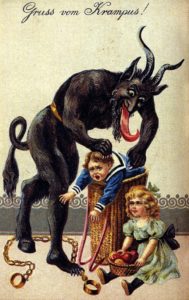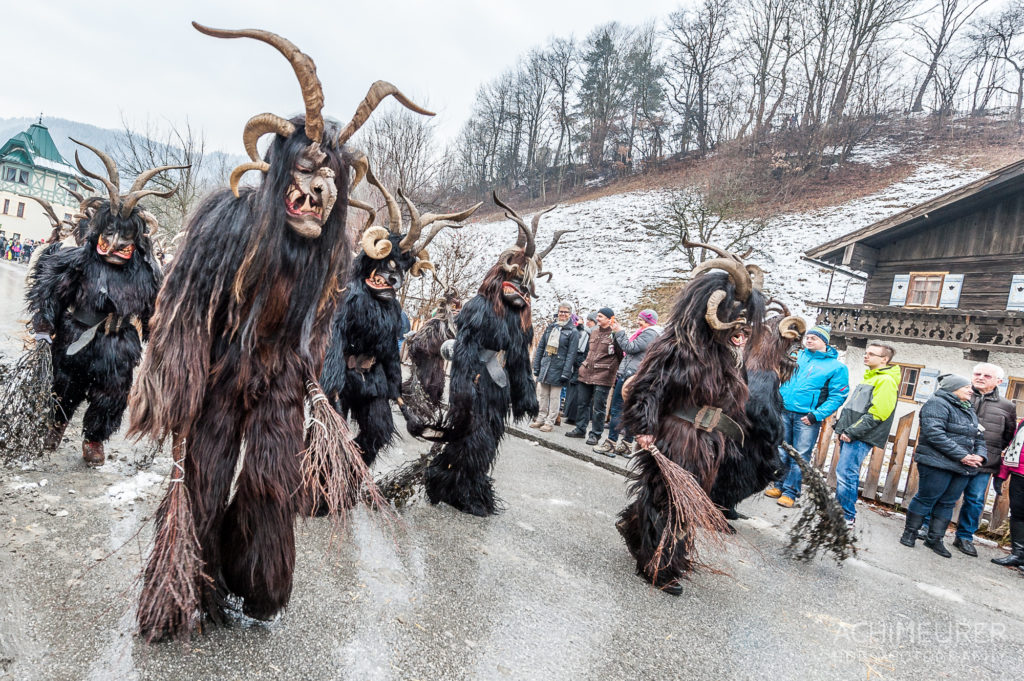The Nightmare Of Christmas
Christmas is a celebration of the most incredible occurrence in human history, the birth of the Savior of Mankind, God Incarnate. It is also a time when myths and legends flourish. Some are tongue-in-cheek, while others are taken quite seriously.
Perhaps the most prevalent myths are those surrounding Christmas night itself. Contrary to what nativity scenes and church pageants portray, there was no stable, no inn, Mary and Joseph were not going from place to place on the night of the birth looking for somewhere to stay, and no wise men came to visit them that night. Yet the glory and magnificence of that special night shines brightly in the Biblical accounts without the modern melodrama and theatrics.
Far more mystifying are the Christmas myths from around the world, many of which fall squarely in the “horror” category. The idealized Western Christmas is a time of jingling bells, snow (unless you live in the South with Christmas temperatures regularly in the 50s and 60s), Christmas trees, lavishly decorated homes, presents spilling out into the hallway, and a seemingly endless barrage of Christmas parties. And of course, the stories. Rudolph, Frosty the Snowman, The Night Before Christmas, The Tin Soldier, A Christmas Carol, and many more. However, in many other countries, Christmas tales take quite a sinister turn.
 In Italy, “Befana” is an old hag who swoops down chimneys with her broomstick, earning her the nickname “The Christmas Witch.” Instead of jolly old Santa Claus, imagine waking up to find a sooty crone placing presents under the tree. “Grýla” is an Icelandic mountain troll who is the mother of the “Yule Lads,” Iceland’s version of Santa Claus. But Grýla is not grandma baking Christmas cookies; she creeps into sleeping towns and devours children who misbehave. “Perchta” comes from Bavarian folklore and is a goddess of sorts who had a fondness for spinning (representing honest, hard work). During the Christmas season, she would seek out the local children and determine who had been working hard and minding their parents and who had not. If the children were good, they would find a silver coin next to their beds. If they had been naughty, Perchta would slit open their stomachs, remove their guts, and stuff the cavity with straw.
In Italy, “Befana” is an old hag who swoops down chimneys with her broomstick, earning her the nickname “The Christmas Witch.” Instead of jolly old Santa Claus, imagine waking up to find a sooty crone placing presents under the tree. “Grýla” is an Icelandic mountain troll who is the mother of the “Yule Lads,” Iceland’s version of Santa Claus. But Grýla is not grandma baking Christmas cookies; she creeps into sleeping towns and devours children who misbehave. “Perchta” comes from Bavarian folklore and is a goddess of sorts who had a fondness for spinning (representing honest, hard work). During the Christmas season, she would seek out the local children and determine who had been working hard and minding their parents and who had not. If the children were good, they would find a silver coin next to their beds. If they had been naughty, Perchta would slit open their stomachs, remove their guts, and stuff the cavity with straw.
“Sinterklaas” is one of the most popular, and most controversial, figures of Christmas legend, because he is not just a tale that parents tell their children. There are parades and festivals in his honor in several European countries, and he is the medieval predecessor of our modern-day “Santa Claus.” The controversy stems from his little helper; instead of a pointy-eared elf,  Sinterklaas is assisted by “Zwarte Piet,” or “Black Pete,” a Moor from Spain. Revelers and party-goers dress in blackface and clown costumes, and this has attracted quite a bit of scorn in recent years.
Sinterklaas is assisted by “Zwarte Piet,” or “Black Pete,” a Moor from Spain. Revelers and party-goers dress in blackface and clown costumes, and this has attracted quite a bit of scorn in recent years.
The most frequently depicted Christmas nightmare is “Krampus,” a horned, devil-like creature who is featured in frightening midnight parades and numerous horror films. He is the antithesis of Saint Nicholas, who brings torment and punishment to naughty children while Saint Nick rewards the good ones. His terrifying appearance has made him a favorite of Christmas cosplayers.
The pattern is quite obvious here: blackmail to get children to obey. If you have children, you have no doubt said something along the lines of “If you’re good, you’ll get a treat, but if you’re bad, you’ll be sorry!” Exhausted parents will do anything to get their kids to behave, but I’d rather visions of sugarplums dance in the heads of my kids rather than nightmares about monsters coming to devour them in their sleep.






























For all have sinned and fall short of the glory of God. Thanks and praise goes out for His grace and mercy otherwise none of us would have made it to double digits. I for one and seriously glad these myths are exactly that, myths.
Yes, I suppose our ancestors always believed in hell in one form or another, and that is what they depicted in their legends, the horror that always stalks us.
It is refreshing in a way to embrace the horrific aspects of legend, rejecting modernity’s false sense of ease and safety and optimism. That’s basically what many conservative Christians do by talking about hell all the time — embracing the horror, refusing to deny the horror in order to live in a shallow, dying optimism. It’s a dreadful way to live, but it does have an appeal and a strength — that’s why some devout Christians are brimstoners.
Jesus came to deliver us from sin and Hell. If it’s not preached then the gospel makes no sense. If Jesus saves, then what did he save us from? It certainly isn’t this world because I’m still here dealing with all the junk everyone else has to deal with. Yes He gives joy and peace that the world doesn’t know of but He also saves us from eternal torment. Not one that man made up but one that is real and horrible. Everyone who is not born of the Spirit of God, following Christ, will spend eternity separate from God. We need to live it, walk it, believe it and preach it. All of it.